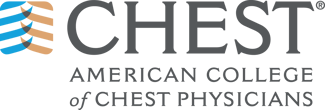CHEST invites interested applicants to submit proposals for deploying a quality improvement (QI) demonstration project in support of an initiative addressing biomarker testing for patients with suspected non-small cell lung cancer (NSCLC).
Up to two awards of $100,000 each are available.
Deadline: Monday, September 25, 2023
Background
In October 2022, CHEST launched a comprehensive education and QI initiative addressing biomarker testing for patients with suspected NSCLC.
An in-person focus group and online quantitative survey were conducted to understand barriers and motivators for ordering biomarker testing.
Drawing from this research, an expert panel of pulmonologists specializing in thoracic oncology developed biomarker checklists. The checklists are designed to be used in clinical practice and covers tissue sampling, tissue processing/testing, and interdisciplinary coordination.
The checklists are intended to help pulmonologists initiate orders for biomarker testing at the earliest point in the diagnostic process to optimize treatment outcomes and quality of life for patients with suspected NSCLC.
DOWNLOAD INSTITUTIONAL CHECKLIST »
DOWNLOAD CASE-BY-CASE CHECKLIST »
Purpose
Through these grants, CHEST seeks to evaluate the impact of the biomarker checklists in achieving the following goals:
- Increased proportion of specimens processed properly after biopsy
- Increased number of patients tested for biomarker mutations
- Increased proportion of patients for whom biomarkers enabled targeted therapy
- Increased care coordination among various disciplines involved in lung cancer diagnosis
and care
Requirements
Applicants will be required to summarize their capacity for socializing the checklists in practice and collecting outcomes to assess overall impact. Specifically, applicants should describe:
- Plan for implementing the biomarker checklists in practice
- Gaps that will be addressed through implementation of the biomarker checklists in practice
- Process for collecting outcomes data, including approach, methodology, analysis, and reporting (with preference given to outcomes related to system improvement, clinician behavior, and patient outcomes)
- Potential barriers that may be encountered and plans to overcome them
- Timeline and key milestones for QI implementation
- Plan for disseminating results
- Plan for sustaining the project beyond the funding period
In addition, a CV and two support letters from hospital leadership (administrator, clinic director, or others) must be provided.
Reporting Expectations
QI projects will commence in Q4 2023 and run for 12 to 18 months. Awardees will provide pre- and post-assessment reports every 3 months for the duration of the grant period.
Awardees should report on the following (when applicable):
- Data on how the proposed practice gaps are being changed with the checklists
- Has identification of patients suspected to have lung cancer increased?
- Are practice guidelines being utilized more frequently?
- Is there better communication around tissue requirements?
- Assay tissue quantity requirements
- Specimen handling
- Has there been more sample preparation discussion to help optimize tissue use?
- Has there been more multidisciplinary planning to prevent ordering delays?
- Have measurable metrics of biomarker testing been identified?
- Has a multidisciplinary plan for process improvement and addressing barriers been developed?
Applicant Eligibility
Applicants may include health care administrators, licensed physicians, physicians-in-training (residents or fellows), other health care professionals, or clinical researchers with relevant experience.
Deadline: Monday, September 25, 2023
If you have any questions about submitting an application, please contact Terri Horton-O’Connell, Director, Grant and Proposal Development, at thorton-oconnell@chestnet.org.
Supported in part by AstraZeneca, Sanofi, and Pfizer

